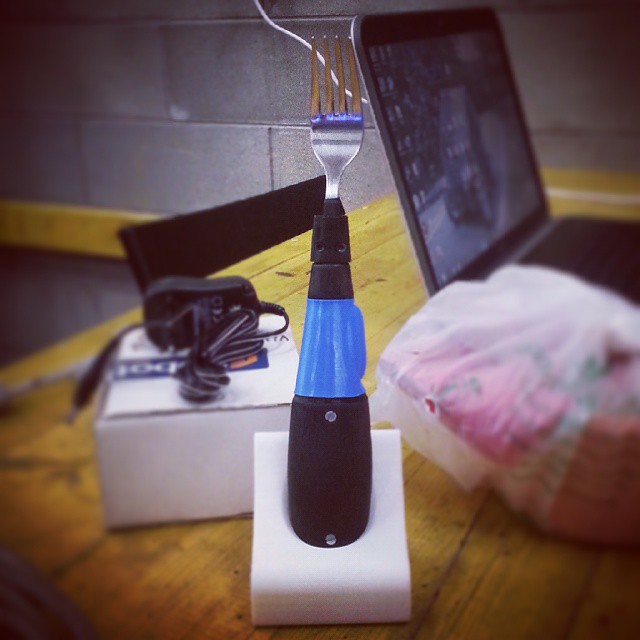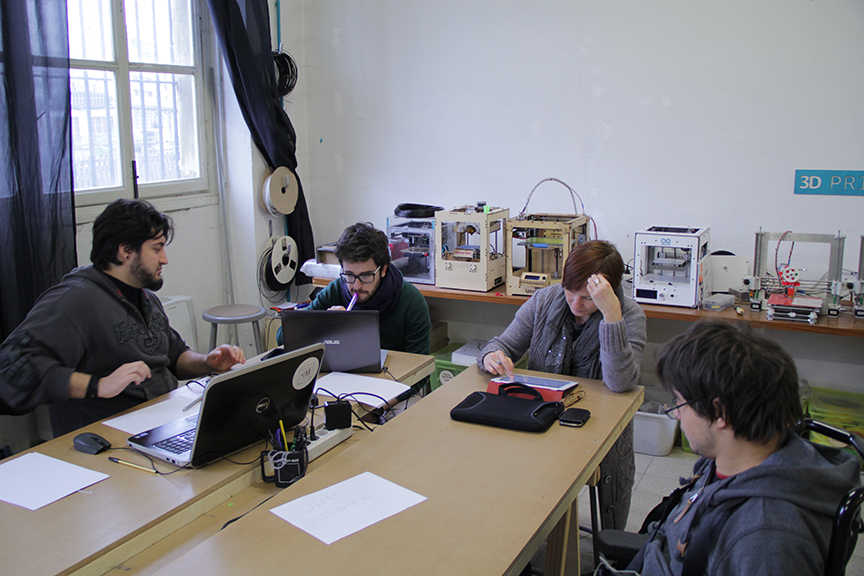Hackability's codesign table
Photo credit: Hackability CC BY-SA
Hackability is an application of mass customization ideas, that produce solutions in a co-design approach. The motivation behind our efforts is to provide social inclusion through a new manufacturing process for people with disabilities.
Very often people with disabilities need too specific solutions that are not addressable by a mass production approach and this requires high degrees of customization in order to fully satisfy their needs. Evidence of this problem is that they often try to build (hack) autonomously customized solutions for themselves, because existing industrial devices are too expensive, are required in fewer quantities, and often paid for by directly by the few who use them. Moreover, the digital fabrication process could be a learning and professional opportunity for makers and designers, creating an active ecosystem through international FabLabs and maker spaces network. For this reason we staredt in 2015 in Turin (Italy), Hackability. Hackability is anaims to identify, invite, inform, interest, and involve makers, designers, technicians, FabLabs, and people with disabilities, in an on-line and off-line community, to realize products for everyday life using new (or improved) digital fabrication processes.
To achieve this goal we use different engaging formats depending on the context. The first is a hackathon (that is a non-competing race), organized in places where the local making community has a sufficient degree of skills for the purpose; the second are workshops, if we need to stimulate the creation of specific skills. Workshops and hackathons go on for at least three weeks to allow people with disabilities to participate actively, together with makers, designers, etc., maintaining, when possible, a more effective co-design gender balance.
For all people involved, working together in a project fosters the development of new skills; not only technical but also social skills towards the management of an entire project.Many participants, after this experience, take part in the community, and sometimes they set up a local group, to continue working together. In this way we intend to scale the project into different sub-communities. Although the concept of community may seem quite abstract, in our experience it is very concrete. For any organized workshop, we had a significant increase of people enrolled from the community. In general, our definition of community is the group of people that make possible co-designing and social inclusion. Hackathons and workshops are usually organized by sending invitations to disability organizations, schools, universities, or local communities, etc. But they can also be organized using our guidelines by third parties creating sub-communities. Third parties are people not officially enrolled in the Hackability staff but work for the same goal, in respect of the same mission and vision. In fact, Hackability's format is open source to those who belong to the community or want to take part: each sub-community that observes its principles and rules can adopt its brand and autonomously bring this project forward and, if needed, we provide support. Formats are accessed through a public open call to people with disabilities, and their caregivers who express ideas/needs/projects and to people and organizations who are active in the world of making and design, who express technical skills/solutions /realization capacity. Since the call has a social impact, and since participation in the workshop contributes to the cultivation of an active community, it is important to advance mapping and stimulate all subjects in every single area or context (associations, local authorities, stakeholders, etc.). We need to be close and motivate those players, with presentations, meetings, and possible partnerships, presenting the advantages of respecting Hackability’s goals. All products made by Hackability are available for non-commercial use, to everyone in Creative Common (CC-by sa nc) at http://hackability.it. Prototypes are the tangible output of our workshops and hackathons. Prototypes are the raw solution built after the co-design process within the workshop: accessible customized and low-cost tools for people with disabilities. An intangible product, but the most important outcome of this process, is the social inclusion for people with disabilities. Hackability's events reduce the stigma of having a disability, changing the way people with disabilities are seen: transforming them from those in need of help, playing a passive role in society, into expert makers and active participants in a shared knowledge process.

Du Spaghi-La forchetta di Ivan: A fork holder device developed based on the handshape of Ivan, a man with a grasping problem who is not able to correctly hold a fork to eat spaghetti pasta.
Photo credit: Hackability CC BY-SA
The ambition behind our efforts is to provide social inclusion through a new manufacturing process for people with disabilities. It enables the transformation from projects and prototypes to final products creating small businesses, encourages the community to create and share projects through the platform based on the open source paradigm. To do so Hackability organizes events/workshop and supports digital artisans in order to inspire the creation of new projects and add value to the process, or produces internally the solutions to go to market. In the end of 2016, Hackability became a non-profit organization. The community is growing nationwide through the organization, in different areas of Italy, thanks to events such as workshops or hackathons that involve local groups. The non-profit organization is intended to finance local events, cure the engagement methodology, train Hackability mentors, help the creation of local groups, and disseminate the results using the Hackability digital platform www.hackability.it. The non-profit organization is funded by companies looking for open innovation, it earns money through the licenses for the commercial exploitation of tools, and redistributes part of the profits to the local groups. Local groups need to provide finances for themselves for examples by offering services to the area. Nowadays, the main local groups are two groups in Torino: Hackability Torino and HackabilityPolito; the local communities in Milan and Brescia have been recently founded and they are growing. Hackability networks will contribute to the improvement in the quality of life for people with disabilities, and it will lead to more independence and greater social integration thanks to increased access to shared, customizable tools and devices for disabilities. It will contribute to cost reductions in Public Health, as well as strengthen the acknowledgement of the difficulties linked to physical disabilities, while reinforcing problem solving capacities. Hackability is also an opportunity of learning open source design skills that is increasing professional opportunities for young makers and designers.



